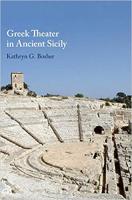
CUP (2021) h/b 248pp £75.00 (ISBN 9781108493871)
When we speak of Greek drama, we almost invariably mean the drama of classical Athens. This is unsurprising. Every extant Greek play comes from fifth- or fourth-century BC Athens, and we have more evidence for the place of theatre here than in any other Greek city or region. Hence we tend to speak confidently of Greek drama (meaning tragedy and comedy) performed at festivals of Dionysus, evolving alongside Athenian democracy and involving comment on or criticism of contemporary politics. Yet, as B. shows in this brilliantly stimulating book, in Sicily the role of theatre was very different indeed.
‘Nothing to do with Dionysus’ (whose worship on the island was not prevalent until the mid-fifth century), it seems if anything to have been more connected with festivals of Demeter (though B. contests even this). She was the goddess favoured by the family of Syracuse’s tyrants, Gelon and Hieron, whose courts glittered with native writers such as the playwright, Epicharmus, one of the fathers of comedy as we know it (he created the first recorded comic drunk), and visiting dramatists such as the Athenian, Aeschylus, whose presence may have influenced Sicilian theatre. Yet how was the work of this great democratic poet received in totalitarian Syracuse? B. argues that, while Athenian audiences undoubtedly perceived his Persians as celebrating the triumph of their egalitarian values over those of despotic Xerxes, Hieron may have expected viewers to make a different comparison: between the successful policies of a good tyrant (Darius, and by extension Hieron) and the disastrous undertakings of a bad (Xerxes).
Indeed, the role of drama in Sicily may have been to unite and bring stability to disparate communities, who had often been forcibly relocated by the tyrants themselves, and to encourage their self-image as Greeks in the face of threats from the ‘barbarian other’, not least the Carthaginians. Many Athenian writers admired Epicharmus, and the Sicilian tyrant, Dionysius I, was so enamoured of Athenian drama that he submitted a tragedy of his own at Athens’ Lenaea festival, where it won first prize (an almost certainly insincere line from it survives: ‘Tyranny is the mother of injustice’).
However, while there was cross-fertilization, and while evidence suggests Western Greek enthusiasm for the work of Euripides, Aristophanes and Menander, we should not overemphasize the influence of Athenian theatre on that of Sicily. Even the architecture and purpose of performing spaces evolved independently (in Sicily lavish theatres built by wealthy individuals were primarily places for assembly, which were also used for drama), while the range of work staged (including mime and ‘phlyax’ plays) was more diverse in Sicily and Magna Graecia than in Athens, and may have had at least an equal influence on later Roman drama.
Drawing on an impressive range of evidence from literature to vase painting to archaeology, B. writes with admirable clarity and a charismatic passion that cannot but convince readers of the importance of her contribution to our understanding of both Sicilian and Athenian theatre. Sadly, she died in 2013, yet this vital work was sufficiently complete in manuscript for Edith Hall and Clemente Marconi to finalise it for publication. To all of them we owe a debt of gratitude, for this is a volume that demands to be read by anyone with an interest in Greek theatre. With two maps, two tables, a bibliography, an index locorum and a general index, it is a well-presented volume. The only regret is that space could not have been found to make many of the fifteen full-colour illustrations larger—in the text, B. makes reference to details on vases which, although illustrated, simply cannot be made out, at least by this reviewer’s eyes.
David Stuttard
